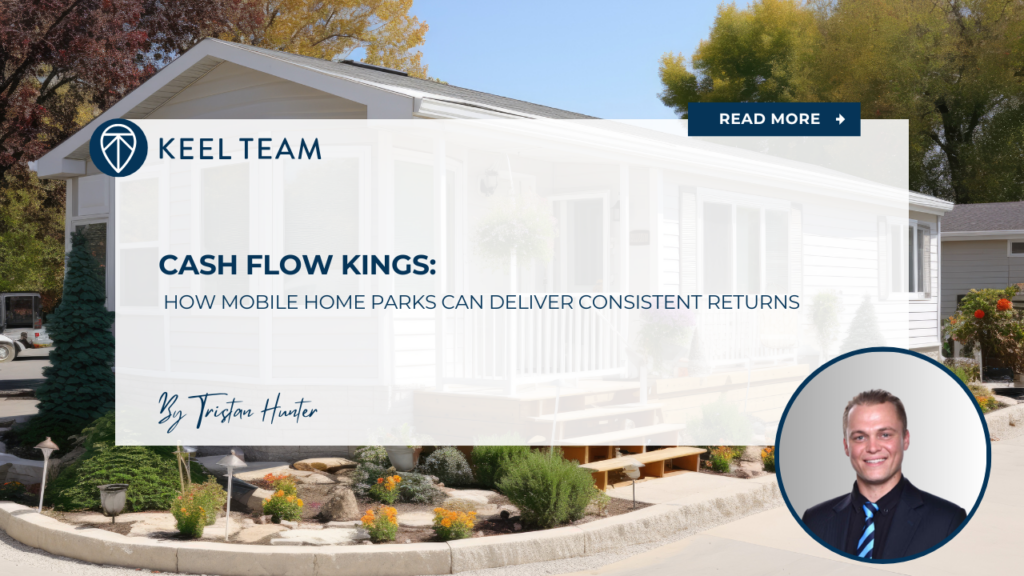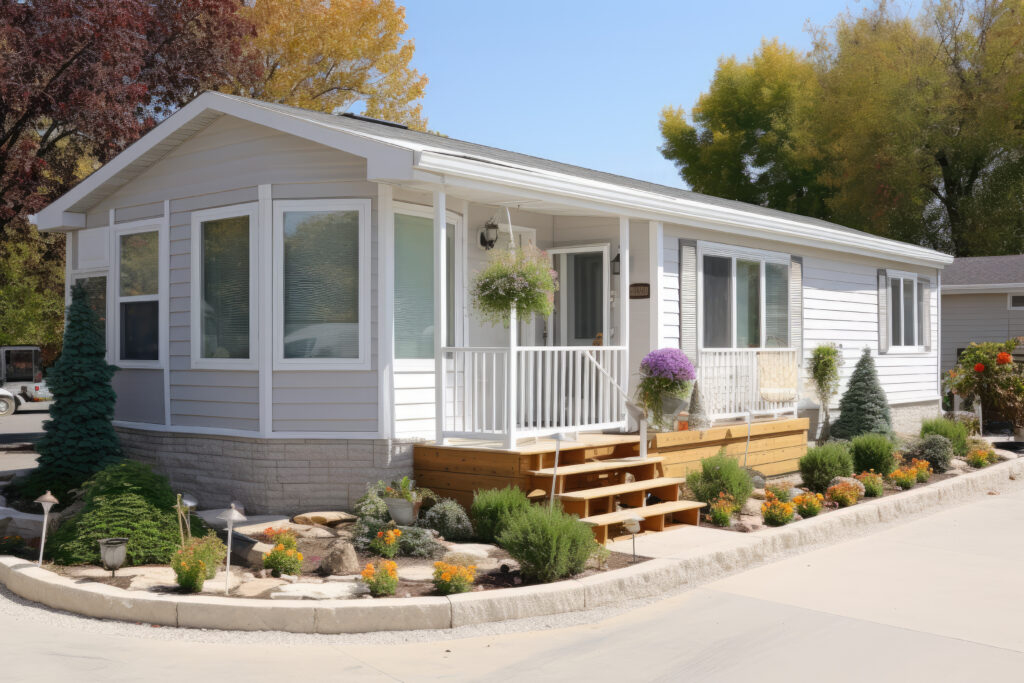Cash Flow Kings: How Mobile Home Parks Can Deliver Consistent Returns
-
 Tristan Hunter - Investor Relations
Tristan Hunter - Investor Relations

Mobile home parks may offer a compelling opportunity for real estate investors seeking steady cash flow and long-term returns. Unlike traditional real estate assets like apartment complexes or commercial properties, mobile home parks may combine affordability, low tenant turnover, and operational simplicity. Consequently, they may appeal to investors looking for passive income. This article explores the financial mechanics behind mobile home park investments, focusing on low tenant turnover, affordable lot rents, and the potential for consistent passive income. Let’s dive into why mobile home parks may be a smart addition to your investment portfolio.
Why Mobile Home Parks Stand Out
Mobile home parks may differ from other real estate investments due to their unique business model. Instead of owning and maintaining numerous rental units, investors typically lease land to residents who own their mobile homes. This approach may reduce maintenance costs and operational complexity. Additionally, the growing demand for affordable housing may drive interest in mobile home parks, as they may provide a cost-effective alternative to traditional homeownership or apartment rentals.
The Appeal of Affordable Housing
Rising housing costs may push more individuals and families toward affordable living options. Mobile home parks may cater to this demand by offering lower-cost housing without sacrificing community or accessibility. For investors, this trend may translate into consistent demand for lot rentals, potentially ensuring stable occupancy rates. Moreover, mobile home parks may attract a diverse tenant base, including retirees, young families, and working professionals, further supporting income reliability.
The Financial Mechanics of Mobile Home Park Investing
Understanding how mobile home parks may generate cash flow is key to evaluating their investment potential. The financial model may revolve around leasing lots to residents, which may create predictable revenue streams. Let’s break down the core components that may contribute to consistent returns.
Low Tenant Turnover: A Cash Flow Stabilizer
One of the standout features of mobile home park investments may be low tenant turnover. Unlike apartment rentals, where tenants may move frequently, mobile home park residents often own their homes. Moving a mobile home can be costly and logistically challenging, often costing thousands of dollars. As a result, residents may stay in place for years, potentially reducing vacancy rates and turnover costs.
Low turnover may benefit investors in several ways. First, it may minimize the need for frequent marketing or tenant screening, saving time and money. Second, it may create a stable community, fostering resident satisfaction and reducing disputes. Finally, consistent occupancy may lead to predictable rental income, a cornerstone of passive investing.
Download our FREE eBook on the Top 20 things to know BEFORE investing in mobile home parks!
Affordable Lot Rents: Driving Demand and Profitability
Mobile home park investments may thrive on affordable lot rents, which typically range from $300 to $600 per month, depending on the location and amenities. These rents may be significantly lower than apartment or single-family home rentals, making mobile home parks an attractive option for cost-conscious residents. For investors, this affordability may translate into high demand and low vacancy rates.
Additionally, lot rents may offer flexibility for incremental increases. Investors may adjust rents over time to account for inflation or property improvements, potentially boosting revenue without pricing out tenants. This balance of affordability and profitability may make mobile home parks a resilient investment, even in fluctuating economic conditions.
Passive Income Potential: Streamlined Operations
Mobile home parks may generate passive income due to their streamlined operational model. Since residents typically own and maintain their homes, investors may face fewer maintenance responsibilities compared to traditional rental properties. Common expenses may include property taxes, utilities, and basic upkeep of shared amenities like roads or community spaces.
To enhance passive income, investors may hire property management companies to handle day-to-day operations, such as rent collection and resident communication. While this may add to expenses, it may free up time and allow investors to focus on scaling their portfolios. With proper management, mobile home parks may deliver consistent cash flow with minimal hands-on involvement.
Maximizing Returns Through Strategic Management
While mobile home parks may offer inherent advantages, strategic management may amplify their financial performance. Investors who approach these assets with a clear plan may unlock additional value and enhance cash flow.
Improving Amenities to Boost Appeal
Upgrading amenities may attract new residents and justify modest rent increases. For example, adding a playground, community center, or pet-friendly spaces may enhance the living experience. These improvements may increase tenant satisfaction, further reducing turnover. However, investors should weigh the costs of upgrades against potential revenue gains to ensure a positive return on investment.
Utility Submetering for Cost Efficiency
Utility costs, such as water or electricity, may erode profits if not managed carefully. Implementing submetering—where residents pay for their own utilities—may shift these expenses away from the investor. This strategy may lower operating costs and increase net operating income, a key metric for evaluating cash flow potential.
Converting to Park-Owned Homes
Some investors may choose to acquire or provide mobile homes for rent, in addition to leasing lots. This approach, known as park-owned homes, may generate higher revenue per lot, as investors can charge both lot rent and home rent. However, it may also increase maintenance and management responsibilities. Investors should carefully assess the trade-offs before pursuing this strategy.

Risks to Consider in Mobile Home Park Investing
While mobile home parks may offer compelling benefits, they may also come with risks. Understanding these challenges may help investors make informed decisions and mitigate potential downsides.
Regulatory and Zoning Hurdles
Mobile home parks may face strict zoning regulations or local ordinances that limit expansion or rent increases. Investors should research local laws before acquiring a property to avoid unexpected restrictions. Engaging with legal or real estate professionals may provide clarity on compliance requirements.
Economic Sensitivity
Although mobile home parks may benefit from affordable housing demand, economic downturns may impact residents’ ability to pay rent. Diversifying investments across multiple properties or regions may reduce exposure to localized economic challenges.
Infrastructure Maintenance
Aging infrastructure, such as roads, water systems, or electrical grids, may require significant capital investments. Conducting thorough due diligence during the acquisition process may help investors identify potential maintenance costs and budget accordingly.
Is Mobile Home Park Investing Right for You?
Mobile home park investments may offer a unique blend of affordability, low turnover, and passive income potential, making them an attractive option for real estate investors. By leasing lots to residents who own their homes, investors may enjoy predictable cash flow with fewer maintenance headaches. Strategic management, such as upgrading amenities or implementing submetering, may further enhance returns.
However, success may depend on careful planning and due diligence. Investors should evaluate market conditions, regulatory landscapes, and property conditions before committing. For those willing to navigate these challenges, mobile home parks may deliver consistent returns and serve as a cornerstone of a diversified portfolio.
Are you looking for MORE information? Book a 1-on-1 consultation with Andrew Keel to discuss:
- A mobile home park deal review
- Due diligence questions
- How to raise capital from investors
- Mistakes to avoid, and more!
Disclaimer:
The information provided is for informational purposes only and is not investment advice or a guarantee of any kind. We do not guarantee profitability. Make investment decisions based on your research and consult registered financial and legal professionals. We are not registered financial or legal professionals and do not provide personalized investment recommendations.

Tristan Hunter - Investor Relations
View The Previous or Next Post
Subscribe Below 👇





